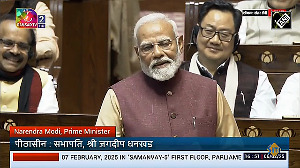Gandhi and Birla, in spite of their well-publicised closeness, too differed - frequently and strongly, explains Bhupesh Bhandari.
 Arundhati Roy recently called Mahatma Gandhi India's first "corporate agent". Ms Roy has never hidden her visceral dislike for "capitalists".
Arundhati Roy recently called Mahatma Gandhi India's first "corporate agent". Ms Roy has never hidden her visceral dislike for "capitalists".
India allows full freedom to profess your economic philosophy, so there's nothing wrong with that. But the bigger question is: did Gandhi really push the interests of businessmen?
Unlike the Left-leaning leaders, Gandhi did mingle with them freely. His closeness to the Bajaj and the Birla families was well known.
He often stayed with them for long periods - he even died in the lawns of Birla House in Delhi.
Ever the practical man, Gandhi knew that the freedom struggle would require money, and the only people he could tap for money were businessmen.
Soon after Bharat Ram, of DCM, got married in 1935, he took his wife to meet Gandhi, who was at that time in Delhi, to seek his blessings. Gandhi was staying in a colony of untouchables.
When the newlyweds came, Gandhi, who was at his spinning wheel, said: "Do you know that my thirst for begging is simply unquenchable? I do not mind taking ornaments either."
Shiela, Bharat Ram's wife, got the message, took her gold bangles off and handed them over to Gandhi.
Was there a quid pro quo? It was said forcefully by his detractors that Gandhi's call to boycott things made abroad helped Indian industry immensely, especially textile mills like DCM. It is difficult to say if that was the intended consequence of the boycott.
What is certain is that even his ardent followers in the business community, men like Ghanshyam Das Birla and Lala Shri Ram (Bharat Ram's father), had serious differences of opinion with Gandhi.
Lala Shri Ram, having supported the Congress in the Swadeshi movement, expected the party to do something for Indian business. Instead, he was alarmed at the rise of the Leftists within the Congress and their disdain for businessmen.
When Gandhi inaugurated the annual meeting of the Federation of Indian Chambers of Commerce and Industry, or Ficci, in 1931, Lala Shri Ram said in plain words that he felt let down by the party.
"We would suggest you a sort of convention for the future that in all matters pertaining to the realm of economics, the Congress before making up its mind will allow us to offer it our suggestions and if necessary have discussions with our members."
This is hardly the stuff today's industrialists would dare to tell their leaders.
Gandhi accepted the suggestion graciously; in fact, he suggested that Ficci should go a step further.
"I want you to make the Congress your own and we would willingly surrender the reins to you. The work can be better done by you."
But he imposed his terms. "If you decide to assume the reins, you can do so only on one condition. You should regard yourself as trustees and servants of the poor. Your commerce must be regulated for the benefit of the toiling millions and you must be satisfied with earning an honest penny."
After that, Gandhi allayed the fears of the businessmen by saying that he did not agree with the Leftist worldview of them.
"I do not for a moment believe that commercial prosperity is incompatible with strict honesty. I know businessmen who are absolutely honest and scrupulous in their dealings. It is, thus, easily open to you to take charge of the Congress."
Gandhi and Birla, in spite of their well-publicised closeness, too differed - frequently and strongly. While both were nationalists, Birla, being a pragmatic businessman, felt uncomfortable about Gandhi's confrontationist agenda.
According to business historian Gita Piramal, Birla begged Gandhi to attend the Round Table Conference (1930), questioned his support for the hardliner Swaraj party (1931), advised him against a second civil disobedience movement (1932) and pleaded with him for the Congress to contest the provincial elections (1935).
"By the mid-1930s, the wedge between Birla and Gandhi had jammed into place," she wrote in her 1998 book, Business Legends.
To leverage the differences between the tallest leader of the day and his principal financier, the imperial government in 1932 offered knighthood to Birla, which he declined.
So much so, in 1942, when it was time to launch the Quit India Movement, Gandhi, who was living at Birla House, moved out to the Congress office, lest it embarrass his host who had been making windfall profits in World War II. Birla, according to one account, had to cajole Gandhi to return to his house.
There is nothing in all this to suggest Gandhi worked like an agent of his businessmen friends.
That aside, there is at least one instance of an acquisition in which Gandhi played a hand: the acquisition of Mukand Iron & Steel Works by Jamnalal Bajaj in 1939.
The company's promoter, Lala Mukand Lal, was a Gandhi supporter. His company had two plants, one in Lahore and the other in Mumbai, but Lal was unable to run them profitably. Gandhi suggested to Bajaj - the two were extremely close; Gandhi called Bajaj his fifth son - that he should buy the business.
Bajaj couldn't refuse. He got his friend, Jeewanlal Motichand Shah, another Gandhi follower, to be a partner in the venture. That's how the Bajaj and the Shah families gained control of Mukand.
According to a new book on Kamalnayan Bajaj (Jamnalal Bajaj's son), Gandhi had deposited money belonging to various trusts in the Bajaj-owned Nagpur Bank.
In 1945, there was some sort of a crisis in the bank, and Gandhi was advised to withdraw the deposits. But Gandhi's trust in the Bajaj family was strong and he refused to do so.












 © 2025
© 2025